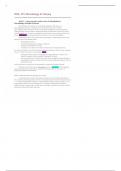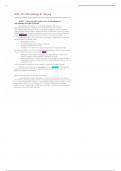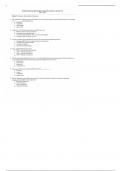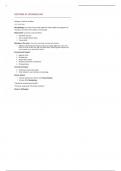Biol 1073 microbiology Study guides, Study notes & Summaries
Looking for the best study guides, study notes and summaries about Biol 1073 microbiology? On this page you'll find 8 study documents about Biol 1073 microbiology.
All 8 results
Sort by

-
BIOL 1073 Microbiology for Nursing Week 1 - Course overview, policy review & introduction to Microbiology in Health & Disease. Microbiology is the study of very small living organisms. Often known as microorganisms, microbes or pathogens. Even before m
- Exam (elaborations) • 28 pages • 2024
-
- R250,92
- + learn more
BIOL 1073 Microbiology for Nursing Week 1 - Course overview, policy review & introduction to Microbiology in Health & Disease. Microbiology is the study of very small living organisms. Often known as microorganisms, microbes or pathogens. Even before microscopes were invented, microorganisms still existed in this world, such as the black plague that caused 3 pandemics.

-
BIOL 1073 Microbiology for Nursing Course overview, policy review & introduction to Microbiology in Health & Disease.
- Summary • 28 pages • 2024
-
- R202,63
- + learn more
Routine Practice: IPAC practices are to be used with all clients/patients/residents/ during all care to prevent and control the transmission of microorganisms in all health care settings. 1. Routine Practice Risk assessment: what are the chances of me being splashed by bodily fluid, what steps will I take to protect myself and my patient? 2. Hand hygiene a. Before initial patient environment contact. b. Before aseptic procedure c. After bodily fluid exposure risk d. After patien...

-
BIOL 1073 Microbiology for Nursing - Course overview, policy review & introduction to Microbiology in Health & Disease.
- Summary • 28 pages • 2024
- Available in package deal
-
- R306,54
- + learn more
Microbiology is the study of very small living organisms. Often known as microorganisms, microbes or pathogens. Even before microscopes were invented, microorganisms still existed in this world, such as the black plague that caused 3 pandemics. While technology advances and new medical procedures are discovered a bacterial virus never really disappears, very often the case numbers drop but that does not necessarily mean the virus is over. For example, even decades later there are still...

-
BIOL 1073 Microbiology for Nursing Course overview, policy review & introduction to Microbiology in Health & Disease.
- Exam (elaborations) • 28 pages • 2024
- Available in package deal
-
- R282,00
- + learn more
Many people thought that these deaths were caused by the mother's milk, however, when this wasn’t the case, Ignaz proposed 2 hypotheses, that there were cadaverous particles, (little pieces of the corps) that students and doctors were getting on their hands from the cadavers they dissected. And when they delivered these babies, the particles would get inside the woman who would then develop the disease and die, Because of this he proposed that outside every patient room there is a han...

-
BIOL 1073 F2023/24 FINAL EXAM REVIEW QUESTIONS (NEW CONTENT)
- Exam (elaborations) • 22 pages • 2024
-
- R241,26
- + learn more
The inheritance of defective genes at birth that are necessary for proper immune system function is an example of a _______________ Immunodeficiency. a. Acquired b. Congenital c. Macrophage d. CD4+T cell 2. In phase 3 of an HIV infection what is most likely to occur: a. Billions of CD4+ T cells are infected b. Persistent swollen lymph nodes c. Persistent yeast infections, fever, diarrhea, and shingles Amount of CD4+ T cells is very low 3. O condition can integrated HIV provirus be removed fro...

-
MIDTERM #1 MICROBIOLOGY REVIEWED THOROUGHLY AND PRECISELY
- Summary • 19 pages • 2024
-
- R221,95
- + learn more
Plasma Membrane: Contain sterols Passive/active transport: lack group translocation Nonmembraous Organelles: Ribosomes Cytoskeleton Centrioles and centrosomes Nucleus: Genetic material Nucleoplasm Mitochondria: powerhouse of the cell Inner Membrane: Cristae FUNGI: Health care associated infections Yeats infections/UTI Can be beneficial Food chain Mycorrhizae Provide food for humans Chemoheterotrophs Colony charac...

-
MIDTERM #1 MICROBIOLOGY LECTURES WHICH ARE WELL EXPLAINED AND PRECISE GRADED A+
- Summary • 14 pages • 2024
- Available in package deal
-
- R294,27
- + learn more
Microbiology: The study of very small organisms often called microorganism or microbes, cannot be seen without a microscope. Black Death: Caused by a yersmia Pestis Rats-fleas-humans Fever, swollen lymph nodes Tissue death Microbes in Our Lives: We tend to associate microbes with disease. trillions of microbes are living in and on your body right now. Most don't harm you at all. In fact, they help you digest food, protect against infection and even maintain your reproduct...
BIOL 1073 F2023/24 FINAL EXAM REVIEW QUESTIONS (NEW CONTENT) Immune, Skin and Eye Infections.

R115 for your summary multiplied by 100 fellow students... Do the math: that's a lot of money! Don't be a thief of your own wallet and start uploading yours now. Discover all about earning on Stuvia


